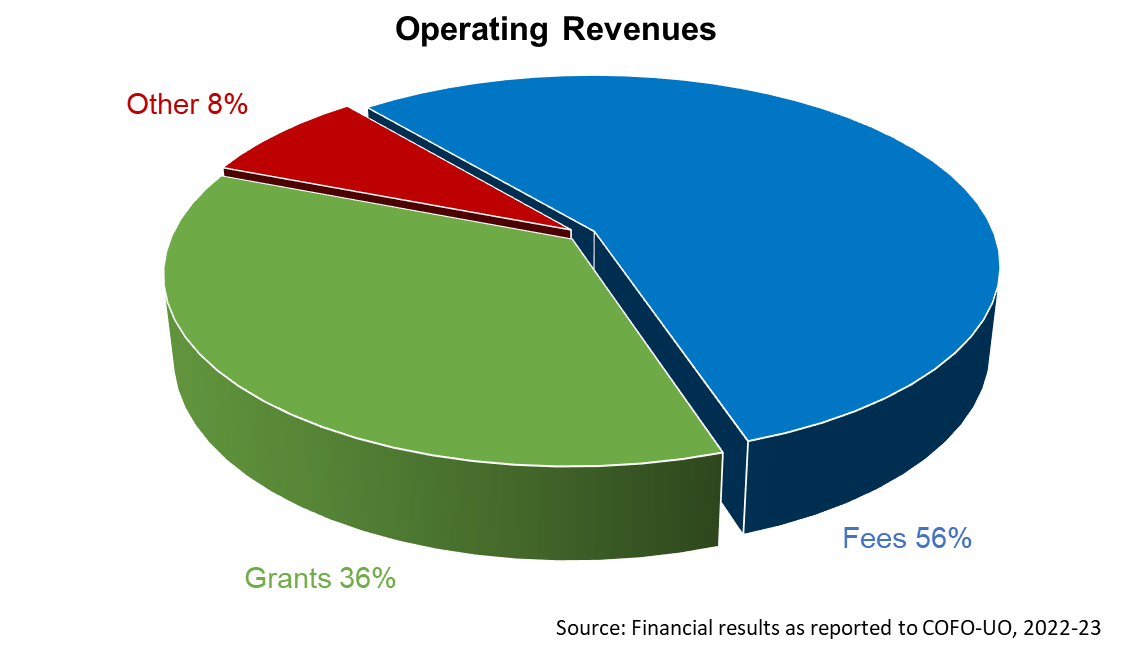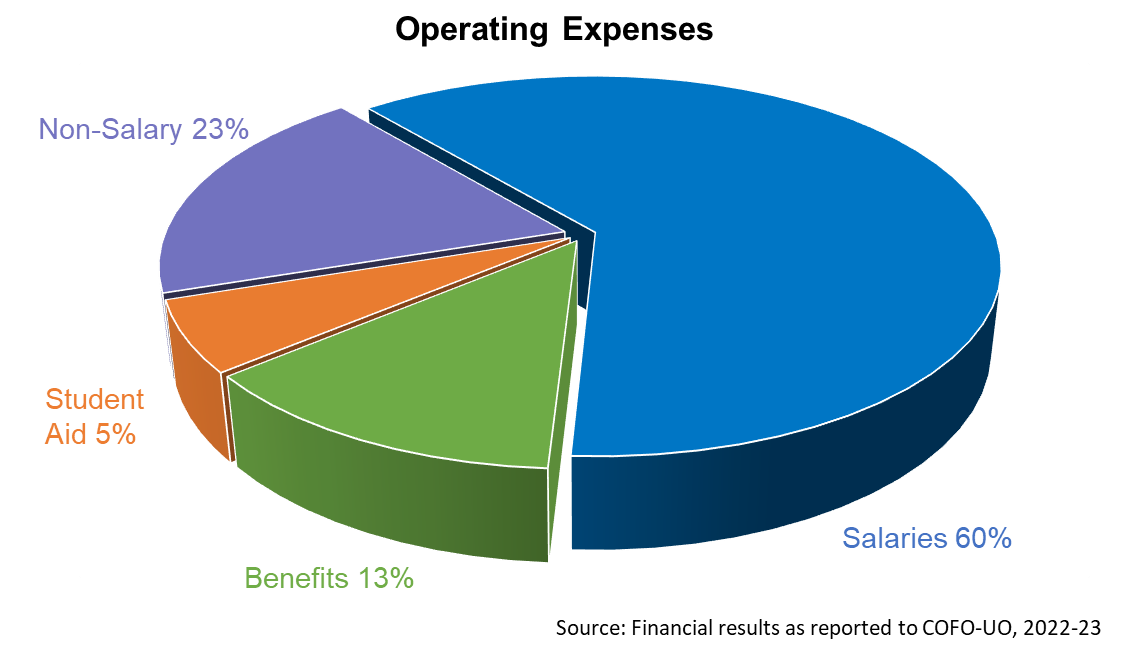Frequently asked questions
Funding & special projects
More than 90 per cent of our operating revenues are related to enrolment. Approximately 56 per cent of our operating budget comes from tuition fees, 36 per cent from grants, and 8 per cent from other income-generating activities.

The majority of our expenditures are for academic and student support operations, with remaining funds supporting activities such as building maintenance, campus computing and technological services, research services, and administrative functions.
Nearly three-quarters of our operating expenditures are for salaries and benefits. The majority of these costs are determined by negotiated collective agreements with our three main unions: the Toronto Metropolitan Faculty Association (TFA), the Ontario Public Service Employees Union (OPSEU), and the Canadian Union of Public Employees (CUPE).

In November 2023, Ontario’s Blue-Ribbon Panel on Postsecondary Education Financial Sustainability recommended an increase of 5 per cent in tuition fees for 2024-25 (8 per cent for professional programs), with additional annual increases in future years. The panel also recommended an increase of 10 per cent in the government core operating grant along with annual increases in future years.
As of late January 2024, the government has not formally announced a decision about the recommendations of the Blue-Ribbon Panel.
In 2019-20, the Government of Ontario required universities to reduce domestic tuition fees by 10 per cent relative to 2018-19 levels. This brought fees back to approximately 2015-16 levels. Fees have remained frozen at that reduced level. Forgoing a tuition increase for even one year has a cumulative impact that will last for years to come. In every year following the freeze, any increases will be based on a lower tuition amount, meaning there will be a continued gap between inflation and incremental revenue. Fees for international enrolment and cost-recovery programming, activity not supported with government grants, are not subject to this policy.
At the same time, there is uncertainty about how the recent federal decision to limit the number of international student study permits will be implemented, and what it will mean for international enrolment at TMU.
Toronto Metropolitan University will continue ongoing conversations with our sector partners and take part in discussions with the Ministry regarding guidelines and implementation details. In tandem, Toronto Metropolitan University will continue to develop contingency plans and options to address potential revenue loss.
The university receives funding for capital projects from sources such as special, one-time government infrastructure allocations or from donations, and the funds are earmarked for specific building projects. Funds for capital projects are one-time only and are not part of the university’s base budget, which funds ongoing expenditures. Capital projects are therefore not affected by base budget reductions, and deferring capital projects will not result in base savings to the university.
Toronto Metropolitan University’s Academic Plan 2020-25 incorporates extensive feedback from students, faculty, and staff. Budget planning and resource allocations are directly tied to the following five priorities, which will guide the direction of the university:
- The Student Experience;
- Scholarly, Research, and Creative Activity and Graduate Studies;
- Advancing Indigenous Initiatives;
- Innovation: Continuing to Challenge the Status Quo; and
- Community and Urban Partnerships.
Toronto Metropolitan University has also undertaken broad internal and external consultations on a range of foundational strategies that will help guide and shape our institution. A developing blueprint, these five complementary plans (including the Academic Plan) articulate our academic and strategic directions:
Uniting these plans is the Strategic Vision 2020-2030. This overarching framework serves as the foundation or roadmap, moving Toronto Metropolitan University toward the same vision and goals.
Consultations for the next Academic Plan are currently underway.
Donations tend to be directed to support designated student bursaries, short-term initiatives or specific projects, rather than being available for general operating purposes.
For permanent staff positions and long-term commitments (e.g., maintenance of buildings, utilities), the university cannot rely on short-term donations or other one-time-only funds such as short-term grants or contracts.
Strategic Mandate Agreements (SMAs) are established through negotiations with the Ministry of Colleges and Universities that provide universities and colleges with an opportunity to communicate priorities, identify areas of institutional strength/focus, and set performance metrics. Toronto Metropolitan University and the Ministry signed the 2020-2025 Strategic Mandate Agreement (external link) on August 31, 2020.
A portion of the university’s funding is tied to performance on metrics as of 2023-24.
Toronto Metropolitan University successfully completed the Ministry’s SMA3 Year 3 Annual Evaluation in 2023, and is currently participating in the Ministry’s SMA3 Year 4 Annual Evaluation process (from November 27, 2023 to March 15, 2024) which continues data collection and analysis, assesses 2023-24 performance, and sets targets for 2024-25. TMU does not anticipate significant financial risks associated with SMA metric performance in 2024-25.
Yes, for example, there is a long-term strategic partnership between Toronto Metropolitan University and Navitas. The cornerstone of this partnership, known as Toronto Metropolitan University International College (TMUIC) (external link) , launched in Winter 2021. It is a new, additional pathway program for international students designed to ease the transition to a Canadian university environment and to prepare them for academic success. The partnership will accelerate TMU’s internationalization goals by growing and diversifying its international student population and enhancing Toronto Metropolitan University’s global reach.
The expectation is that the ongoing activities related to this initiative will be supported by new, incremental revenue that is not related to our current enrolment. The Government of Ontario announced its support for the school of medicine, including funding for 94 undergraduate and 105 postgraduate seats that are resourced separately from TMU’s existing enrolment. The City of Brampton donated an existing building along with funds to support renovations to establish the physical site for the school, and TMU is working with the Federal and Provincial governments and private donors to seek additional funding to support capital development.
Ontario is facing a shortage of primary care physicians who are unevenly distributed across communities, contributing to growing unmet care needs. For example, Brampton is one of Canada’s most culturally diverse and fastest-growing cities. In spite of this dynamism, its residents experience significant challenges with access to appropriate, high-quality primary care. TMU has the opportunity to engage with the Brampton community and the surrounding region to develop a model for health care that can be adopted throughout Ontario and beyond.
Audited financial statements are available online.
Detailed information, including estimates of annual revenues and expenditures, can be found at the following locations on Toronto Metropolitan University’s website:
Along with sector partners and the Council of Ontario Universities (COU), we continue to make the case for sustainable, ongoing funding as recommended by the Ontario Blue-Ribbon Panel on Postsecondary Education Financial Sustainability. We have not yet attained an increase in the level of our operating grants. This continues to be a goal, and we will continue to demonstrate the need for an increased level of ongoing funding.
The funding metrics that are part of the government’s Strategic Mandate Agreement process make an increasing portion of an institution’s existing government grants subject to meeting performance targets rather than allocating meaningful new funding.
The federal government sets a cap for each province, and individual provinces decide on the allocation among their institutions. At this time, the Province has not announced how it will allocate spaces within Ontario. TMU is advocating for an allocation that allows continued growth from the university’s relatively low current levels. Our university has taken a measured approach to international enrolment, with roughly 10 per cent of our enrolment accounted for by international students compared to a system average of about 20 per cent. It should be noted that the cap does not apply to graduate programs.
Students, faculty & staff
We understand the financial burden faced by many students. Student support expenditures by the university for 2023-24 to date (as of January 31, 2024) total $42.2 million.
In addition, the Government of Canada has suspended the accumulation of interest on Canada Student Loans and Canada Apprentice Loans as of April 1, 2023.
More information about financial support is available on the Student Financial Assistance website.
As demonstrated in past years, Toronto Metropolitan University is focused on our core values throughout the budget-planning and consultation process – especially protecting and enhancing the student experience. The 2024-25 budget cycle will continue to prioritize the student community. In the past year, the university has made significant investments in student wellness, for example.
Student aid is funded through a combination of tuition fees and additional revenue streams, such as donations. In some cases, specific bursaries are funded through allocations made from department/faculty budgets.
TMU participates in the Student Access Guarantee (SAG) as required by the provincial government, covering direct costs for unmet need as assessed by OSAP through scholarships, bursaries or work-study employment.
International tuition provides an important revenue stream for TMU. This revenue supports core teaching and learning functions at the university, and is also used for student support services, including international student support.
Enrolment, Recruitment and International
Given student demand for Toronto Metropolitan University programs, we are on track to meet domestic enrolment targets for Fall 2024. It is important to note that Toronto Metropolitan University is unable to increase domestic enrolment because the government has capped the number of funded spaces.
The federal government’s recently announced cap on international student visas and delays with visa approvals present some challenges with international enrolment planning. Our current level of international enrolment is low relative to other Ontario universities, and increasing this is an important objective.
The G. Raymond Chang School of Continuing Education offers a combination of degree-credit and certificate-credit courses. Degree credit enrolment is counted as part of our enrolment that is funded by the government, which is capped at the overall university level. Other Chang School enrolments that are not degree-credit are not subject to limits and we will work to increase enrolment in these courses.
More than 90 per cent of our operating revenues come from tuition fees and grants associated with enrolment. In other words, our financial health as an institution relies on enrolment. Demand for Toronto Metropolitan University programs is strong. That said, domestic spaces are capped by the government, which precludes us from increasing the number of domestic students to generate additional revenue.